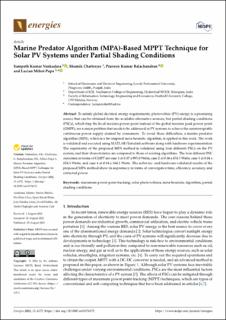Marine Predator Algorithm (MPA)-Based MPPT Technique for Solar PV Systems under Partial Shading Conditions
Peer reviewed, Journal article
Published version
Permanent lenke
https://hdl.handle.net/11250/3015734Utgivelsesdato
2022Metadata
Vis full innførselSamlinger
Sammendrag
To satisfy global electrical energy requirements, photovoltaic (PV) energy is a promising source that can be obtained from the available alternative sources, but partial shading conditions (PSCs), which trap the local maxima power point instead of the global maxima peak power point (GMPP), are a major problem that needs to be addressed in PV systems to achieve the uninterruptable continuous power supply desired by consumers. To avoid these difficulties, a marine predator algorithm (MPA), which is a bio-inspired meta-heuristic algorithm, is applied in this work. The work is validated and executed using MATLAB/Simulink software along with hardware experimentation. The superiority of the proposed MPA method is validated using four different PSCs on the PV system, and their characteristics are compared to those of existing algorithms. The four different PSC outcomes in terms of GMPP are case 1 at 0.07 s 995.0 Watts; case 2 at 0.06 s 674.5 Watts; case 3 at 0.04 s 654.1 Watts; and case 4 at 0.04 s 364.2 Watts. The software- and hardware-validated results of the proposed MPA method show its supremacy in terms of convergence time, efficiency, accuracy, and extracted power.

